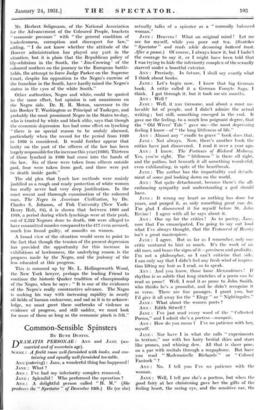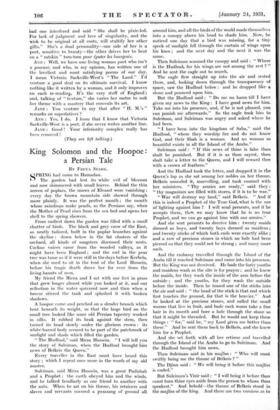Common-Sensible Spinsters
BY RUTH DUFFIN.
DRAMATIS PERSONAE : ANN and JANE (un- married and of uncertain age). SCENE : A firelit room well-furnished with books, and con- taining and equally well-furnished tea-table. ANN (entering): Jane, a wonderful thing has happened JANE : What ?
ANN : I've had my inferiority complex removed. JANE : Splendid ! Who performed the operation ? ANN : A delightful person called " H. M." (She produces the " Spectator" of December lath.) He (or she) actually talks of a spinster as a " normally balanced woman."
JANE Heavens ! What an original mind ! Let me see for myself, while you pour out tea. (Snatches " Spectator " and reads while devouring buttered toast. After a pause.) Of course, I always knew it, but I hadn't the courage to say it, or I might have been told that I was trying to hide the inferiority complex of the sexually starved under a boastful exterior.
ANN : Precisely. In future, I shall say exactly what I think about books.
JANE Let's begin now. I know that big German book. A critic called it a German Forsyte Saga, I think. I got through it, but it took me six months.
ANN : Well ?
JANE : Well, it was tiresome, and about a most un- lovable lot of people, and I didn't admire the actual writing ; but . still, something emerged in the end. It gave me the feeling, to a much less poignant degree, that the " Old Wives' Tale " gave me—the most depressing feeling I know—of " the long littleness of life."
ANN : Almost any " cradle to grave" book does that.
JANE : Not always. Now, there's another book the critics have just discovered. I read it over a year ago.
ANN : I know. The Fortunes of Richard Mahony. Yes, you're right. The " littleness " is there all right, and the pathos, but beneath it all something wonderful, even exhilarating, in spite of the heartbreak.
JANE : The author has the impartiality and detach- ment of some god looking down on the world.
ANN : Not quite detachment, because there's the all- embracing sympathy and understanding a god should have.
JANE : It wrung my heart as nothing has done for years, and purged it, as only something great can do. I'm glad I discovered it for myself before St. John Ervin ! I agree with all he says about it.
ANN : One up for the critics ! As to poetry, Jane, now that I'm emancipated, I'm going to 'say out loud what I've always thought, that the Testament of Beauty isn't a great masterpiece.
JANE : I agree. But as far as I remember, only one critic ventured to hint as much. It's the work of an old man; and bears the signs of it—prosiness and prolixity. I'm not a philosopher, so I can't criticize that side. I can only say that I didn't feel any fresh wind of inspira- tion lifting my hair as I read, so to speak.
ANN : And you know, those loose Alexandrines ! If rhythni so subtle that long stretches of a poem can be read as proSe! Well, I read it as prose to John Smith, who thinks he's a prosodist, and he didn't recognize it as verse. There are fine passages, I grant you, but I'd give it all away for the " Elegy " or " Nightingales."
JANE : What about the women poets ?
ANN : Edith Sitwell ?
• JANE :. I've just read every word of the " Collected Poeins," and I admit she's a poetess—manquic.
ANN : HOW do you mean ? I've no patience with her, myself.
JANE : Nor have I in what she calls " experiments in texture," nor with her hairy bestial skies and stars like prunes, and whining dew. All that is sheer pose, on a .par with recitals through a megaphone. But have you read " Mademoiselle Rieharde " or. " Colonel Fantock " ?
Ass : No. I tell you I've no patience with the woman.
JANE : Well, I tell you she's a poetess, but when the good fairy at her christening gave her the gifts of the feeling. heart, the seeing eye, and the sensitive ear, the bad one interfered and said " She shall be pixie-led. For lack of judgment and love of singularity, and the wish to be original at all costs, will stultify her other gifts." She's a dual personality—one side of her is a poet, sensitive to beauty—the other drives her to beat on a " ratskin " tom-tom pour epater lee bourgeois.
ANN : Well, we have one living woman poet who isn't a poseuse, and who, in my opinion, has written one of the loveliest and most satisfying poems of our day. I mean Victoria Sackville-West's " The Land." I'd venture a good deal on its ultimate survival. I know nothing like it written by a woman, and it only improves on each re-reading. It's the very stuff of England and, talking of " texture," she varies her metre to suit her theme with a mastery that conceals its art.
JANE : You venture to say that after " H. M.'s " remarks on superlatives ?
ANN : Yes, I do. I know that I know that Victoria Sackville-West is a poet, if she never writes another line.
JANE : Good ! Your inferiority complex really has been removed !
(They are left talking.)







































 Previous page
Previous page